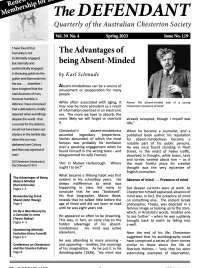Frank Sheed (pictured) was a prominent Australian Catholic author who knew Chesterton well. Sheed published several of Chesterton’s last works under the imprint of Sheed and Ward, the publishing firm he founded in 1926, in company with his wife Maisie Ward, Chesterton’s first biographer.
John Young, a Melbourne-based philosopher and a frequent contributor to The Defendant, offers some personal recollections of Frank Sheed.

F.J. Sheed (1897-1981) published his masterpiece, Theology and Sanity, in 1947. I read it when I was about twenty, and was very impressed by it.
In 1958, I travelled overseas for the first time and attended meetings of the Catholic Evidence Guild in London. The Guild had been founded in London in 1918, and trained Catholics to teach and defend the Catholic Faith in Hyde Park and other venues, where “soapbox orators” presented a variety of views on a variety of subjects.
One evening I was introduced to Sheed. He started to talk to me about cricket in Australia. I didn’t know much about it, and I think he was disappointed. He never forgot that he was an Australian, though he spent most of his life in England.
He had an easy-going manner, and one might have assumed that he had a happy childhood, particularly because of his mother, a woman with a strong Catholic
faith, who easily made friends.
In fact he had an unhappy childhood. His father was a Communist who talked Communism at mealtimes, and who physically abused Frank and his brother John. John died at the age of sixteen, and his mother thought he had died of a broken heart because of rejection by his father.
Frank seemed to survive unhurt, but a sign that he had not occurred in 1956. He fell from the platform in Hyde Park, London, as he was addressing a crowd at Speakers Corner. He hurt his head and seemed to hallucinate. It was as though traumatic memories which had been repressed now came to the surface.
He had studied law at Sydney University. He took a break from his studies to travel to England in 1926, where he became involved with the Catholic Evidence Guild. He had a real talent for “soapbox oratory”, but also a keen theological intellect and a remarkable ability to present difficult theological concepts in a clear and attractive way.
He returned to Sydney to complete his studies in law, and would no doubt have become an outstanding barrister; but God had other plans for him. He had fallen in love with a member of the Catholic Evidence Guild, Maisie Ward, and asked her to marry him. She couldn’t make up her mind, but after his return to Sydney she sent him a telegram accepting his proposal. She wrote it in Latin,
hoping the post office people would be unable to read it.
Having done his final two years of law at Sydney University in one year, he returned to London. He had passed his exams but never practised law. He and Maisie married in 1926 and founded the publishing firm of Sheed and
Ward, which went on to produce many influential books on theology and related subjects.
In 1956, Rome conferred a Doctorate in Theology on him for his writings, particularly Theology and Sanity, a work which shows how a knowledge of theology can transform one’s outlook on reality. True theology, enlightened by the virtue of faith, gives us a share in God’s own knowledge.
Sheed was writing and publishing at a time when there were many influential Catholic authors, including GK Chesterton and Ronald Knox, and he knew them
personally. He also helped make European authors better known in England through translations of their books published by Sheed and Ward.
I happened to meet him in Sydney not long after his wife died (she died in 1975), and we spoke of people I had known in the Catholic Evidence Guild. By this time the Guild, which had been so vibrant, had all but disappeared. And his two children, Rosemary and Wilfred, had both given up their Catholic Faith.
He seemed rather lonely: he and Maisie had been very close. When he spoke to me of her, it was as though she was still present to him. Now they are together for eternity.
